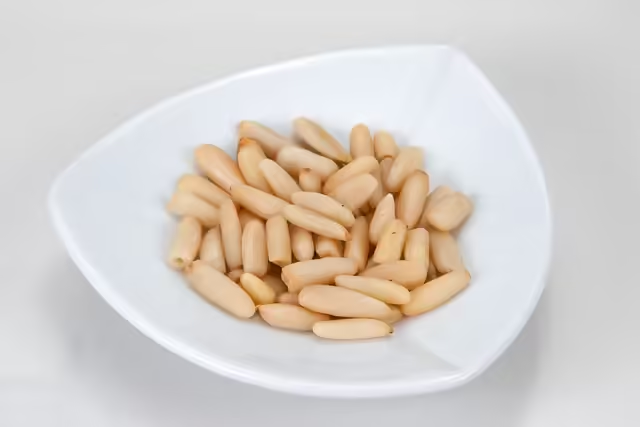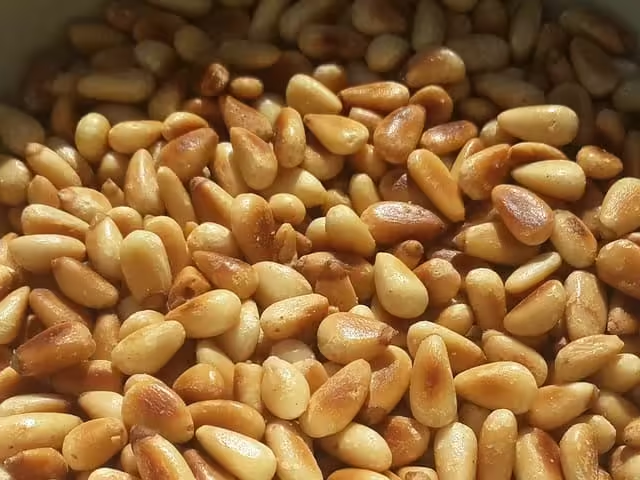Pine nuts may be small, but they pack a big punch when it comes to flavor and nutrition. These delightful seeds are not just a tasty addition to your meals; they also offer a range of health benefits. In this blog post, we will explore in this Food Stories what pine nuts are, their nutritional value, culinary uses, and some fun facts that make them truly special.
What Are Pine Nuts?
According to nuturally.com Pine nuts are the edible seeds of pine trees. They are found inside the pine cones and are harvested from various species of pine trees. The most common types of pine nuts come from the Western White Pine, Sugar Pine, and Ponderosa Pine. These seeds have a soft, buttery texture and a slightly sweet, nutty flavor that makes them a favorite in many dishes.
Pine Nuts Nutritional Benefits
Pine nuts are not just delicious; they are also reach with nutrients. Here are some key health benefits:
1. Rich in Healthy Fats
Pine nuts are high in monounsaturated fats, which are heart-healthy fats. These fats can help lower bad cholesterol levels and reduce the risk of heart disease. Including pine nuts in your diet can be a tasty way to support cardiovascular health.
2. Rich with Protein
Pine nuts are a good source of protein, making them an excellent choice for vegetarians and vegans. Just a handful of pine nuts can provide a significant amount of protein, which is essential for building and repairing tissues in the body.
3. High in Antioxidants
These tiny seeds are rich in antioxidants, which help combat oxidative stress in the body. Antioxidants can protect your cells from damage caused by free radicals, potentially reducing the risk of chronic diseases.
4. Source of Vitamins and Minerals
It is loaded with essential vitamins and minerals, including vitamin K, magnesium, zinc, and iron. Vitamin K is important for bone health, while magnesium supports muscle and nerve function. Zinc is crucial for a healthy immune system, and iron is necessary for transporting oxygen in the blood.

Culinary Uses of Pine Nuts
Pine nuts are incredibly versatile and can be used in a variety of dishes. Here are some popular ways to incorporate them into your meals:
1. Pesto Sauce
One of the most famous uses of this nuts is in pesto sauce. Traditional pesto combines with this nuts, fresh basil, garlic, Parmesan cheese, and olive oil. This vibrant sauce is perfect for pasta, sandwiches, or as a dip.
2. Salads
Adding this to salads can enhance both the flavor and texture. Their crunchy consistency pairs well with leafy greens, fruits, and cheeses. Try tossing them into a spinach salad with feta cheese and cranberries for a delicious combination.
3. Baking
It can be used in baking as well. They add a delightful crunch to cookies, muffins, and bread. Consider adding them to your favorite cookie recipe for an extra layer of flavor.
4. Stir-Fries and Roasted Dishes
It can be tossed into stir-fries or roasted vegetables for added richness. Their nutty flavor complements a variety of ingredients, making them a great addition to savory dishes.
Fun Facts
- Harvesting: This nuts are harvested by collecting pine cones from the trees and then extracting the seeds. This process can be labor-intensive, which is one reason why pine nuts can be more expensive than other nuts.
- Culinary History: It have been used in cooking for thousands of years. Ancient Romans and Greeks valued them for their flavor and nutritional benefits.
- Storage: It can go rancid quickly due to their high oil content. It’s best to store them in an airtight container in the refrigerator or freezer to prolong their freshness.
- Sustainability: It is a sustainable food choice. Pine trees can live for hundreds of years, and harvesting their seeds does not harm the trees.
Conclusion
Pine nuts are a delicious and nutritious addition to any diet. With their rich flavor, impressive health benefits, and versatility in the kitchen, they deserve a place in your pantry. Whether you’re making pesto, adding them to salads, or enjoying them as a snack, pine nuts can elevate your meals and contribute to your overall health. So next time you’re at the grocery store, consider picking up a bag of these tiny powerhouses!
Also read Asparagus Shatavari and its Nutritional Benefits











